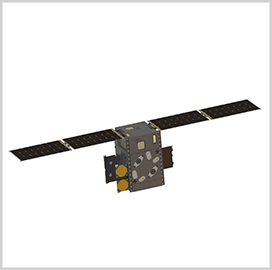The Air Force Research Laboratory’s small satellite is carrying out extended operations after completing its mission to assess the survivability and performance of commercial-off-the-shelf technologies in the geosynchronous Earth orbit.
The 12-unit CubeSat, dubbed Ascent, was developed as part of the Small Satellite Portfolio within the AFRL Space Vehicles Directorate and launched to GEO in December 2021, AFRL said Tuesday.
“Now that we have data that proves the effectiveness in that region, we will be monitoring for trends in spacecraft health over time, continuing nominal operations, and exploring options to transfer to another agency as a training or demonstrations asset,” said Capt. Sunderlin Jackson, program manager of Ascent.
Fifteen researchers from AFRL contributed to the Ascent program, which has $10 million in funding.
Ascent is the first CubeSat flown by AFRL to the GEO space environment.
Related Articles
Immigration and Customs Enforcement has reported record interest in its latest hiring campaign, receiving more than 150,000 applications nationwide and extending over 18,000 tentative job offers. The recruitment effort is part of a push to expand ICE’s workforce with new financial incentives and eligibility changes, the Department of Homeland Security said Tuesday. At the Potomac Officers Club’s 2025 Homeland Security Summit on Nov. 12, hear from U.S. Customs and Border Protection Chief Digital Transformation Officer James McCament on a panel discussing how to balance innovation with the law enforcement mission. Register now for this critical GovCon networking event! Incentives Driving Applications To boost hiring, ICE
The House Appropriations Committee on Tuesday introduced a continuing resolution, or CR, that seeks to prevent a government shutdown by extending government funding through Nov. 21. The panel said Tuesday the proposed Continuing Appropriations and Extensions Act, 2026, is expected to be considered on the House floor this week. “Keeping our government open and working for the American people is not a partisan issue – and this clean, short-term funding extension reflects that. As we continue advancing FY26 conference negotiations, this measure prevents the chaos of a shutdown and allows us to stay focused on restoring regular order,” said House
The Department of Energy’s Oak Ridge National Laboratory and the University of Tennessee, Knoxville, have launched a four-year collaborative effort that seeks to accelerate innovation around nonequilibrium quantum materials by exploring the use of high-performance computing. ORNL said Tuesday researchers from SLAC National Accelerator Laboratory and Los Alamos and Lawrence Berkeley national laboratories are participating in the Controlled Numerics for Emergent Transients in Nonequilibrium Quantum Matter, or CONNEQT, initiative. Don’t miss the panel on how quantum computing is impacting national security at the 2025 Intel Summit on Oct. 2! It will feature Sandia National Laboratory’s Andrew Baczewski, among other distinguished





